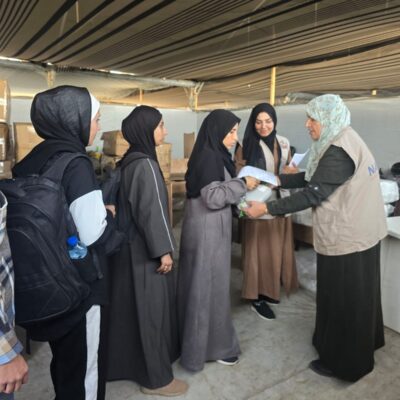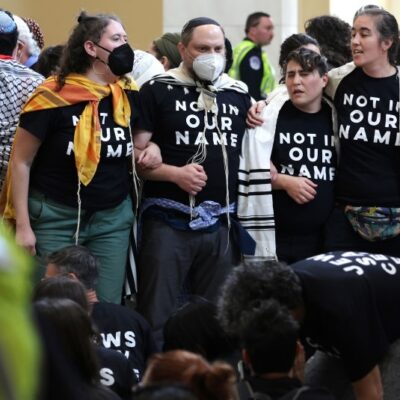EXECUTIVE DECISION
Jewish groups were ready for Trump’s indefinite refugee hiatus, but say the effects on families will be devastating
HIAS and Jewish family services that place refugees in communities lament White House order halting resettlements, prepare to focus on other immigration issues

Alex Wroblewski/Getty Images
A woman attends a rally on behalf of refugees in New York City in 2017.
Last Friday night, Rabbi James Greene and his 16-year-old daughter had Shabbat dinner, then headed to Bradley International Airport in Hartford, Conn., where they picked up a family of three who were arriving as refugees from Venezuela. One was the same age as Greene’s daughter. Their birthdays are 10 days apart.
“The most often repeated commandment in the Torah is to welcome the stranger, and so that that really has been the calling of our work,” Greene, who is CEO of Jewish Family Service of Western Massachusetts (JFSWM), told eJewishPhilanthropy. “It’s not just about bringing those three people, it’s all of the generations that will come from that family.”
After dropping the family at their “home host,” also members of the Jewish community, who will support them for their first month settling into their new lives in the United States, Greene looked across the car at his daughter and said, “This may be the last new refugee arrival that we received for a period of time.”
Less than a week later, his words became official.
On Wednesday, two days into President Donald Trump’s second term, the president issued an executive order indefinitely halting all refugee resettlement, canceling travel for thousands of refugees who were approved to come into the United States, leaving them stranded across the globe, including in Iran, where many Jews have been waiting anxiously to leave since 2016.
For Jewish agencies that work with refugees, Trump’s actions were anticipated, and they had prepared to pivot their efforts in response to them, but for families who were awaiting parents, siblings and friends to join them in America, the effects are devastating.
“The executive order [whose title is] ‘Realigning the United States Refugee Admissions Program’ is no mere realignment,” Mark Hetfield, the CEO of HIAS, formerly known as the Hebrew Immigrant Aid Society, which places refuges at agencies such as JFSWM, told eJP. “It completely slams the door on all refugees, even though the Refugee Admissions Program is a safe and legal immigration pathway for people who are fleeing persecution.”
Greene’s agency was established in 1890 to support Jewish refugees and immigrants, and today, it serves refugees of all backgrounds who are fleeing war and persecution. Last year, the agency resettled 481 refugees and several hundred other immigrants, mostly from Ukraine, who did not fall under refugee status but whose programs were also halted during Trump’s first days in office.
This week, JFSWM was scheduled to receive three family reunification cases, as well as a family from Afghanistan that was fleeing the Taliban, but all flights were canceled at the last minute, upending the lives of those involved.
JFSWM employees will continue working with refugees who recently arrived until the middle of April, when they will shift to other jobs at the agency. Although Trump has only paused refugee entry to the United States for 90 days, there is no guarantee it will resume. Greene said no one will lose their job at his agency because of the executive order, as the organization still does plenty of other work besides refugee resettlement.
The other services JFSWM provides, including mental health and youth services, are more critical than ever, Greene said, especially for immigrants already in the U.S. who will need extra support.
Although Trump also massively cut refugee resettlement numbers during his first term, the actions time around were put into place much more quickly, Trip Oldfield, CEO of Jewish Family and Children’s Service of Long Beach and Orange County (JFCS) near Los Angeles, whose organization also provides refugee resettlement services, told eJP.
“He’s essentially doing exactly what he did last time, although he’s much better prepared this time, because he’s had a few years to plan,” Oldfield said of Trump. Like JFSWM, no one at his agency will lose jobs, with employees shifting focus to supporting refugees already in the U.S.
Restarting a refugee program takes time, Oldfield said, and agencies are still recovering from Trump’s last presidency.
“The Biden administration took two years to get the [refugee resettlement] program up and running,” Oldfield said. “We really only had a viable refugee resettlement program in the U.S. two years of the last eight years, and now this is going to do exactly the same thing again. You spend all this money developing a refugee program in the U.S., and then you just demolish the system.”
Many refugees waiting to enter the U.S. are Jews in Iran who have been caught in limbo since 2016, when Trump halted their journey during his previous term. JFCS was only able to procure enough funding from anonymous Persian Jews in the United States last October to hire a Farsi speaker to work with new refugees. Since then, 20 Iranian Jews and 15 Iranian Bahá’í entered the U.S. through JFCS to reunite with their families. Hundreds more have been approved to enter the country, but, once again, they are trapped.
A member of the Iranian Jewish community who came into the U.S. as a refugee in late December told eJP they were “distraught” over the changes in policy. Their parents and siblings have been waiting to leave for nine years. They are worried the Iranian government will discover that they received refugee status and seek to punish their family by not allowing them to leave. “I’m so sorry for the people in Iran,” the individualsaid, speaking on condition of anonymity to protect their family in Iran.
The new executive order is one of many affecting immigration that Trump issued in the past week. He also issued orders stating that those in the country illegally can be arrested in schools and religious institutions, and he sought to limit so-called “birthright citizenship,” though a federal judge in Seattle on Thursday temporarily blocked the order from taking effect. He also fired top immigration court officials. Even immigrants with their papers in order are calling JFCS worried they will be deported, according to Oldfield.
“They’re rightly scared because of all this rhetoric that’s floating around about immigrants,” he said. “There’s this misconception with refugees that there’s a safety issue, which is absolutely lunacy. Refugees are the most well-screened individuals in terms of security that come into the U.S.”
Hetfield described the refugee resettlement hiatus as a “shanda” (a shame, in Yiddish) as it “heartlessly and indiscriminately” barred travel across the board, even among those that had already been through an extensive vetting and approval process and had made arrangements to travel to the U.S. He added: “HIAS will fight it as hard as we can.”
Although the health and security screenings vetting refugees can take years, approval to receive refugee status doesn’t last forever. Even if Trump reinstates the refugee program in 90 days, refugees’ “documentation will likely expire, and they will have to start the process again, a process that is years long,” Greene said. “During the first [Trump] administration, we had clients [whom] we were expecting to receive who didn’t come. They did not survive to come to us when resettlement started again.”

 Add EJP on Google
Add EJP on Google
















